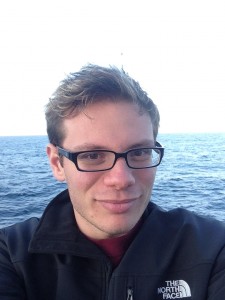Andrew Babbin is currently a postdoctoral fellow at MIT, studying the nitrogen cycle in the marine environment and its impact on global biogeochemistry and climate. His research mainly concerns anaerobic, i.e. existing in the absence of oxygen, microbial metabolisms. His current research questions relate to how oxygen concentrations control marine microorganisms: what they do, how fast they do it, and who is responsible for getting it done. On this chief scientist training cruise, he will be measuring rates of in situ nitrate reduction and nitrite oxidation, two important processes that can exist at the transition between oxygenated and deoxygenated environments. He will also measure how these rates are affected by changing oxygen concentrations. He is further interested in looking at how the microbial community of denitrifiers (organisms that convert forms of nitrogen available to all life in the ocean to make essential proteins and DNA to inaccessible forms, thereby limiting life in the ocean and feeding back on global climate) structures itself at varying oxygen concentrations. This question of community structure extends to many environments (and even to the human body) in understanding how an assemblage of single-celled organisms interacts and evolves to create the chemistry observed across the planet.

